-
 bitcoin
bitcoin $112195.049338 USD
2.42% -
 ethereum
ethereum $4124.915858 USD
2.81% -
 tether
tether $1.000570 USD
0.02% -
 xrp
xrp $2.861568 USD
2.25% -
 bnb
bnb $1000.346670 USD
3.04% -
 solana
solana $209.070819 USD
3.38% -
 usd-coin
usd-coin $0.999870 USD
0.02% -
 dogecoin
dogecoin $0.235379 USD
2.65% -
 tron
tron $0.335681 USD
-0.20% -
 cardano
cardano $0.803501 USD
3.38% -
 hyperliquid
hyperliquid $47.120881 USD
3.56% -
 chainlink
chainlink $21.501300 USD
3.44% -
 ethena-usde
ethena-usde $1.000571 USD
0.02% -
 avalanche
avalanche $29.793378 USD
3.62% -
 stellar
stellar $0.366964 USD
2.42%
What is the difference between cross-period contracts and perpetual contracts? Which is more suitable for short-term trading?
Perpetual contracts are more suitable for short-term crypto trading due to their flexibility and lack of expiration, allowing quick entry and exit without rolling over positions.
Apr 29, 2025 at 10:07 am
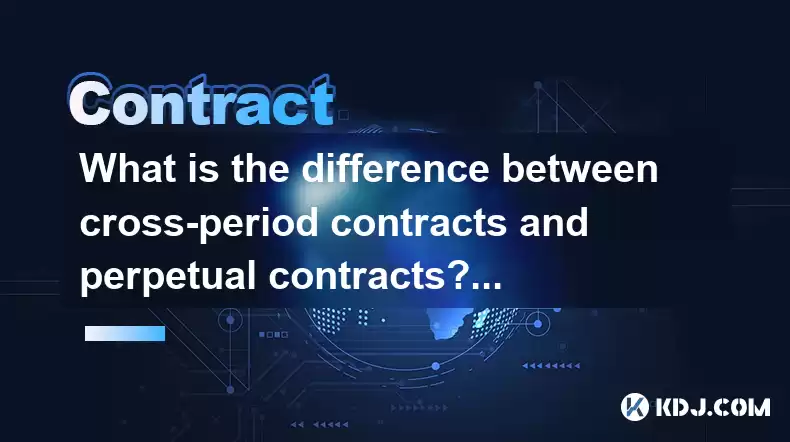
In the world of cryptocurrency trading, futures contracts play a crucial role in allowing traders to speculate on the future price movements of digital assets. Among these, cross-period contracts and perpetual contracts stand out as two popular types. Understanding the differences between these two types of contracts is essential for traders, especially when considering their suitability for short-term trading.
Understanding Cross-Period Contracts
Cross-period contracts, also known as traditional futures contracts, are agreements to buy or sell a cryptocurrency at a predetermined price on a specific future date. These contracts have a fixed expiration date, which can range from a few days to several months. The key feature of cross-period contracts is that they are settled at the end of the contract term, either through physical delivery of the underlying asset or through cash settlement.
In cross-period contracts, traders can take long or short positions based on their market predictions. If a trader believes the price of a cryptocurrency will rise, they can enter into a long position by agreeing to buy the asset at the future date. Conversely, if they believe the price will fall, they can take a short position by agreeing to sell the asset at the future date.
Understanding Perpetual Contracts
Perpetual contracts, on the other hand, are a type of futures contract that does not have an expiration date. These contracts are designed to mimic the spot market closely and allow traders to hold positions indefinitely. Unlike cross-period contracts, perpetual contracts do not require settlement at any specific time, making them more flexible for traders.
A unique feature of perpetual contracts is the funding rate mechanism. This mechanism ensures that the price of the perpetual contract remains closely aligned with the spot price of the underlying asset. The funding rate can be positive or negative, depending on the difference between the perpetual contract price and the spot price. If the perpetual contract price is higher than the spot price, long position holders pay short position holders. Conversely, if the perpetual contract price is lower, short position holders pay long position holders.
Key Differences Between Cross-Period and Perpetual Contracts
The primary difference between cross-period and perpetual contracts lies in their expiration dates. Cross-period contracts have a fixed expiration date, while perpetual contracts do not expire. This fundamental difference affects how traders approach these contracts and their trading strategies.
Another significant difference is the settlement process. Cross-period contracts are settled at the end of the contract term, either through physical delivery or cash settlement. Perpetual contracts, however, do not require settlement and can be held indefinitely. The funding rate mechanism in perpetual contracts serves as a continuous settlement process, aligning the contract price with the spot market.
Additionally, trading flexibility varies between the two types of contracts. Cross-period contracts require traders to manage their positions around the expiration date, which can limit flexibility. Perpetual contracts offer greater flexibility, as traders can hold positions for as long as they wish without worrying about an expiration date.
Suitability for Short-Term Trading
When it comes to short-term trading, the choice between cross-period and perpetual contracts depends on several factors. Perpetual contracts are generally more suitable for short-term trading due to their flexibility and lack of an expiration date. Traders can enter and exit positions quickly without the need to roll over contracts, which can be necessary with cross-period contracts.
The funding rate mechanism in perpetual contracts can also be advantageous for short-term traders. By closely tracking the spot market, perpetual contracts allow traders to capitalize on short-term price movements without the risk of significant divergence from the spot price. Additionally, the funding rate can provide an additional source of income or cost, depending on the trader's position and market conditions.
Cross-period contracts, while less flexible, can still be suitable for short-term trading if managed correctly. Traders need to be aware of the expiration date and plan their trades accordingly. Rolling over positions before the expiration date can be necessary to maintain a short-term trading strategy. However, this requires careful management and can add complexity to the trading process.
Practical Considerations for Short-Term Trading
For traders interested in short-term trading with either cross-period or perpetual contracts, here are some practical considerations:
Leverage: Both types of contracts often allow for high leverage, which can amplify gains but also increase risk. Traders should use leverage cautiously, especially in short-term trading, where market volatility can be high.
Risk Management: Implementing effective risk management strategies is crucial. This includes setting stop-loss orders, monitoring positions closely, and being prepared to exit trades quickly if the market moves against the trader's position.
Market Analysis: Short-term trading requires a keen understanding of market trends and the ability to analyze price movements quickly. Traders should use technical analysis tools and stay informed about market news and events that could impact cryptocurrency prices.
Trading Platform: Choosing a reliable and user-friendly trading platform is essential. The platform should offer real-time data, fast execution, and the ability to manage positions effectively. For perpetual contracts, the platform should also provide clear information about the funding rate.
FAQs
Q1: Can I convert a cross-period contract to a perpetual contract?A1: No, cross-period contracts and perpetual contracts are distinct financial instruments and cannot be converted from one to the other. However, traders can close their position in a cross-period contract and open a new position in a perpetual contract if they wish to switch.
Q2: How often is the funding rate calculated in perpetual contracts?A2: The funding rate in perpetual contracts is typically calculated and paid every 8 hours, though this can vary depending on the exchange. Traders should check the specific rules of the exchange they are using.
Q3: Are perpetual contracts more expensive to trade than cross-period contracts?A3: The cost of trading perpetual contracts can be influenced by the funding rate. If the funding rate is positive, long position holders pay short position holders, which can increase the cost of holding a long position. However, if the funding rate is negative, short position holders pay long position holders, which can decrease the cost of holding a long position. Cross-period contracts do not have a funding rate, but they may have other fees associated with trading and settlement.
Q4: Can I trade both cross-period and perpetual contracts on the same platform?A4: Yes, many cryptocurrency exchanges offer both cross-period and perpetual contracts on the same platform. Traders can choose the type of contract that best suits their trading strategy and switch between them as needed.
Disclaimer:info@kdj.com
The information provided is not trading advice. kdj.com does not assume any responsibility for any investments made based on the information provided in this article. Cryptocurrencies are highly volatile and it is highly recommended that you invest with caution after thorough research!
If you believe that the content used on this website infringes your copyright, please contact us immediately (info@kdj.com) and we will delete it promptly.
- SWIFT, Consensys, and Blockchain Settlement: A New Era for Global Finance?
- 2025-09-30 06:25:13
- Gold Dollar Coin, Mystery, Upright 5: Unearthing Hidden History and Whale-Sized Speculation
- 2025-09-30 06:25:13
- Meme Coins, Smart Money, 2025 Riches: Navigating the Hype
- 2025-09-30 06:30:01
- VeChain (VET) Price Prediction 2026: Bullish Breakout or Enterprise Stalemate?
- 2025-09-30 06:30:01
- BetFi Coin: Is This the Next High-ROI Crypto Presale?
- 2025-09-30 06:30:01
- Bitcoin, Nvidia, and the Potential Upside: Lessons from the AI Boom
- 2025-09-30 06:30:15
Related knowledge
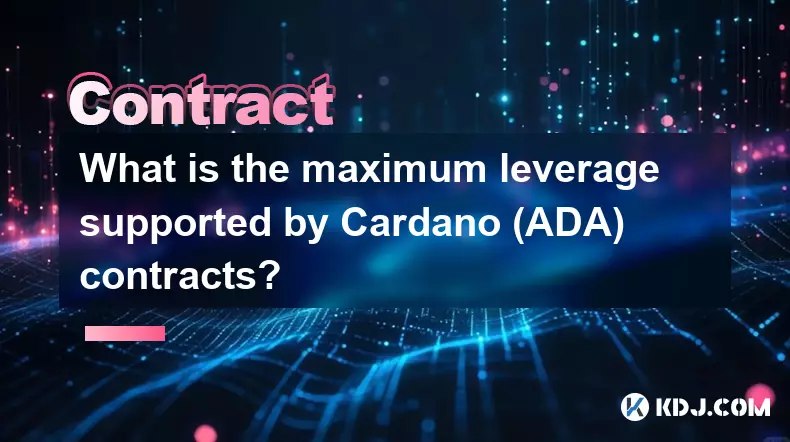
What is the maximum leverage supported by Cardano (ADA) contracts?
Sep 30,2025 at 03:37am
Understanding Leverage in ADA Derivatives Trading1. Leverage in cryptocurrency futures and perpetual contracts allows traders to control larger positi...
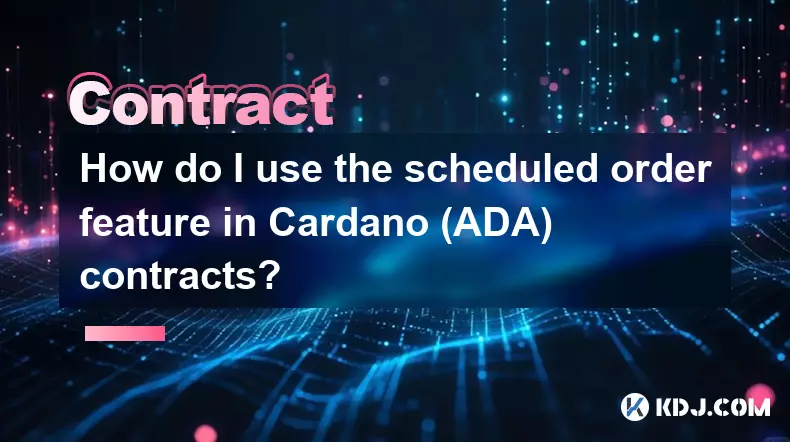
How do I use the scheduled order feature in Cardano (ADA) contracts?
Sep 28,2025 at 10:18pm
Understanding Scheduled Orders in Cardano Smart ContractsCardano operates on a proof-of-stakes consensus mechanism and uses the Plutus scripting langu...
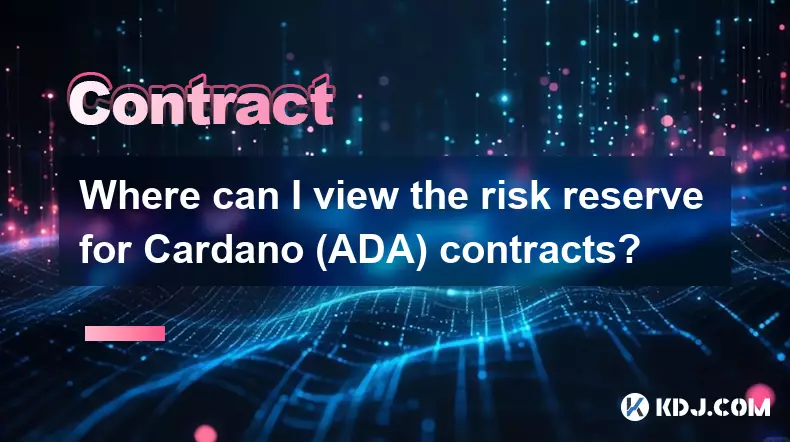
Where can I view the risk reserve for Cardano (ADA) contracts?
Sep 29,2025 at 09:19pm
Risk Reserve Overview in Cardano (ADA) Ecosystem1. The concept of a risk reserve within the Cardano blockchain does not align with traditional central...

How do I enable the "scalping-only" mode for Cardano (ADA) contracts?
Sep 24,2025 at 03:19am
Understanding Scalping Strategies in Crypto Derivatives1. Scalping in cryptocurrency trading refers to executing multiple short-term trades within min...
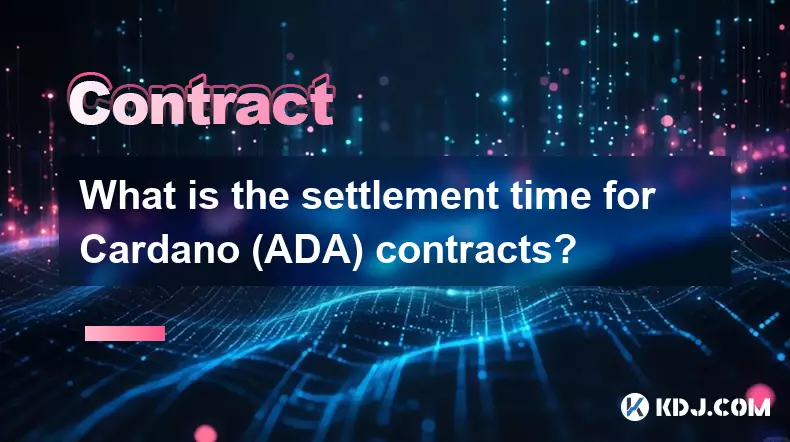
What is the settlement time for Cardano (ADA) contracts?
Sep 28,2025 at 04:18am
Understanding Cardano's Contract Settlement Mechanism1. Cardano operates on a proof-of-stake consensus model known as Ouroboros, which fundamentally i...
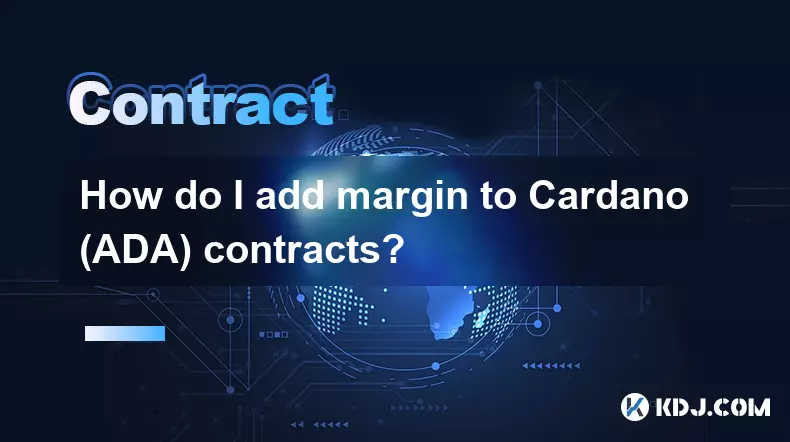
How do I add margin to Cardano (ADA) contracts?
Sep 27,2025 at 07:54pm
Understanding Margin in Cardano (ADA) Smart ContractsCardano operates on a proof-of-stake blockchain that supports smart contracts through its Plutus ...

What is the maximum leverage supported by Cardano (ADA) contracts?
Sep 30,2025 at 03:37am
Understanding Leverage in ADA Derivatives Trading1. Leverage in cryptocurrency futures and perpetual contracts allows traders to control larger positi...

How do I use the scheduled order feature in Cardano (ADA) contracts?
Sep 28,2025 at 10:18pm
Understanding Scheduled Orders in Cardano Smart ContractsCardano operates on a proof-of-stakes consensus mechanism and uses the Plutus scripting langu...

Where can I view the risk reserve for Cardano (ADA) contracts?
Sep 29,2025 at 09:19pm
Risk Reserve Overview in Cardano (ADA) Ecosystem1. The concept of a risk reserve within the Cardano blockchain does not align with traditional central...

How do I enable the "scalping-only" mode for Cardano (ADA) contracts?
Sep 24,2025 at 03:19am
Understanding Scalping Strategies in Crypto Derivatives1. Scalping in cryptocurrency trading refers to executing multiple short-term trades within min...

What is the settlement time for Cardano (ADA) contracts?
Sep 28,2025 at 04:18am
Understanding Cardano's Contract Settlement Mechanism1. Cardano operates on a proof-of-stake consensus model known as Ouroboros, which fundamentally i...

How do I add margin to Cardano (ADA) contracts?
Sep 27,2025 at 07:54pm
Understanding Margin in Cardano (ADA) Smart ContractsCardano operates on a proof-of-stake blockchain that supports smart contracts through its Plutus ...
See all articles


























![[Pycoin] PI Coin -Shocking Listance of Pycoin?! 'Rebellion' This time ... Pay attention to #paikoin [Pycoin] PI Coin -Shocking Listance of Pycoin?! 'Rebellion' This time ... Pay attention to #paikoin](/uploads/2025/09/29/cryptocurrencies-news/videos/pycoin-pi-coin-shocking-listance-pycoin-rebellion-time-pay-attention-paikoin/68da82f23cec1_image_500_375.webp)















































